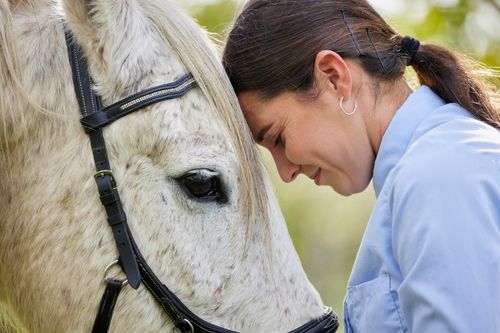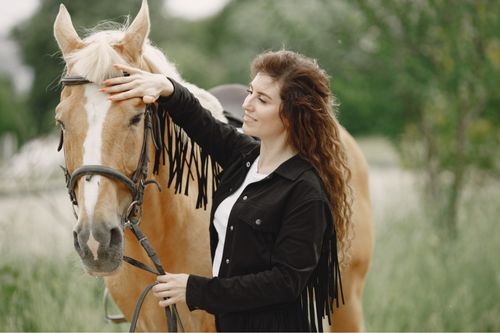Table of Contents
People train horses because their strength is incomparable to humans, so we must understand their psychology to train them well. If we don’t employ better psychological practices, horses won’t be able to perform well, and it might also harm their health. Modern equine psychology aims to predict expected horse behavior under various settings and to establish those conditions that encourage responses that match the horse handler’s goals.
What is equine psychology?

Equine psychology helps to understand the nature of horses for more effective training, better management, or simply strengthening your bond with your horse.
The study of equine psychology helps to
- Understand equine behavior for a better horse care
- To better manage horses as a rider, owner, or trainer
- Professional development for everyone who works with horses.
- Work in the equestrian sector to pursue your passion.
Through equine psychology, you will be able to understand and recognize normal behavior in your horse and how to respond correctly to odd behavior. The study of equine behavior lays the groundwork for more sensitive and knowledgeable horse care and training.
Topics covered in equine psychology
- Genetics
- Perception and behavior
- Communication
- Social behavior
- Sexual and reproductive behavior
- Learning and training
- Behavioral disorders
Why study Equine psychology?
Many horse care professionals and horse owners do not understand the importance of a horse’s behavior and psychology until they face the inability to make a horse accomplish what is required.
The natural path is to attempt to address the challenging behavior patterns of a horse on your own; however, this strategy might only contribute to the solution of a specific problem.
Instead, we must understand horses to assess their demands properly. Only then can we determine that the problem stems from our expectations of the horse and our approach to the problem.
If we wish to cooperate with these magnificent creatures, we must recognize our differences and try to understand their needs and objectives as best we can.
Important factors of equine psychology

To properly handle horses and enjoy their company the most, we must first understand them. To accomplish so, we must examine the horse’s origins and learn how horses lived in the wild. Equine psychology gives us insight into horses’ natural behavior and helps us prepare an atmosphere that suits them the best.
Eleven natural survival traits of the horses
- The horse relies on flight as its primary survival mode as a prey animal. Horse’s natural predators are large creatures like cougars, wolves, and bears, its ability to evade these predators is natural. To completely understand horses, we must first understand their intrinsic flightiness.
- Horses are among the most perceptive domestic animals. They can identify predators because they are prey species. Unnoticed by humans, a stimulus often causes panic in horses; we frequently misinterpret this reaction as ‘spookiness’ or undesirable behavior. Humans must understand what stimulus affects the horse and how to train them properly.
- The horse has a rapid reaction time. To live, a prey animal must react quickly to a perceived predator. So horses might act in this way.
- Fearful stimuli can desensitize horses. They must soon learn what is dangerous (e.g., lion, cougar, etc.) and what is harmless (e.g., tumbleweeds, birds, a discolored rock, etc.) so that they do not spend their entire lives fleeing.
- Horses forgive, but they never forget. They remember bad situations the most. It is essential to ensure that the horse’s first training experience is favorable.
- Horses classify most events as either- a) something not to fear, so ignore or explore it, or b) something to fear, so escape. As a result, when introducing something new, the horse must be shown that ‘a’ is the case. Again, making all training experiences enjoyable for the horses and humans is essential.
- Horses are readily tamed. The horse is a herd animal with an established dominance hierarchy. Human authority can be quickly established throughout training if done appropriately, without causing the horse to become overly scared.
- Horses assert authority by controlling their peers’ movements. Horses accept dominance when we force them to move when they do not want to, and when another animal prevents them from moving, they want to flee.
- A round pen, long line, or hobbles to control the horse, or a more dominant horse in the field chasing the less dominant one away are all ways to assert authority over the horse.
- A horse’s body language is unique to the equine species. As a highly sociable animal, the horse communicates its feelings and intentions to its herd mates through vocalization and body language. Someone who works with horses must understand their body language to be a good trainer.
- The horse is a precocial species, meaning that newborn foals are neurologically mature when born. They are most vulnerable right after birth. Therefore, they can recognize danger and evacuate if necessary.
Job opportunities for equine psychologists
- Veterinary assistant
- Assistant in commercial equine center/outlet
- Horse groomer
- Pet shop assistant
- Horse trainer
- Horse riding instructor
- Assistant in horse riding schools
- Pony party event organizations
Key takeaways
- Equine psychology is nothing but learning how to perceive, interact, manage and train horses. It is the science used to train horses to make them feel safer and more secure around humans.
- We must understand horses to understand their demands. Only then can we determine that the problem might emerge in our expectations of the horse and how we deal with it.
- The horse is a prey animal and relies on flight as its primary survival mode. Horse’s predators are animals such as cougars, wolves, and bears, its ability to evade these predators is natural. To train horses effectively, we must first understand their intrinsic flightiness.
Did you find this blog informative? If so, please share your thoughts in the comments section below. Click here to contact us for more information on equine psychology. We would be happy to assist you with your queries.
Liked this blog? Read next: Psychology facts | 50 interesting facts you must know about!
FAQ
Q1. What is equine OCD?
Ans- Osteochondrosis (osteochondrosis dissecans; OCD) is a disease syndrome of growing cartilage related to different clinical entities such as epiphysitis, subchondral cysts, and angular carpal deformities, which happens to grow in animals of all species, including horses.
Q2. Can horses sense a good person?
Ans- According to one study, horses can detect human facial expressions and recall a person’s mood. Scientists discovered that animals respond more positively to persons they have seen smiling and are fearful of those they have seen frowning.
Q3. What causes wobbler syndrome in horses?
Ans- Wobbler syndrome in horses has no recognized cause. Genetic predisposition, feeding excessive energy and other nutrients, rapid growth, physical trauma, decreased copper/increased zinc levels, or a combination of these variables causes the condition.







